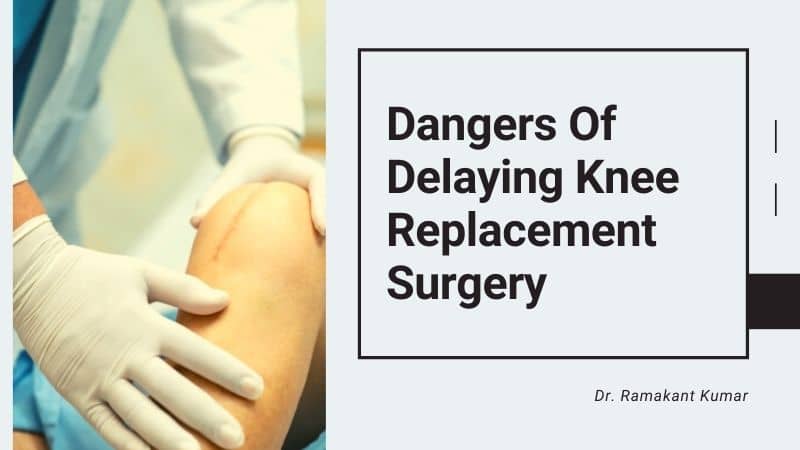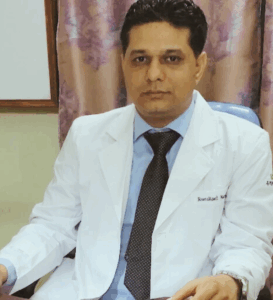Because of the unawareness of the Dangers of Delaying Knee Replacement Surgery many patients delay the surgery stating a number of reasons. Patients state these reasons, mostly out of fear and misinformation – says Dr. Ramakant Kumar.
Most patients delay unnecessarily for several perceptual reasons. These include fear of the unknown, fear of surgery, fear of ‘losing’ a body part, fear of the post-op surgery pain, fear that they will end up worse than they started.
However, Dr. Ramakant, Best Surgeon for Knee Surgery Patna, says that his patients are thankful after they get Knee Surgery, and wish they had done it sooner.
Therefore, the main purpose of this blog is to make them aware of the possible Dangers of Delaying Knee Replacement Surgery, so that they can make their decision maturely.
Contents
5 Dangers of Delaying Knee Replacement Surgery
The Risks and Dangers of Delaying Knee Replacement Surgery often involve the deterioration of the joints, increased pain, and lack of mobility.
Depending on the severity of the joint disease, a surgeon may attempt several less invasive, non-surgical methods first. This less invasive method includes anti-inflammatory medications and physical therapy.
If none of these methods appear to be working or if the patient has become sedentary due to joint pain, a surgeon may recommend Total Knee Replacement surgery.
We all know that Knee Replacement Surgery is Elective. Thus, for many of the reasons listed above, patients sometimes consciously delay their knee replacement surgery, which can have some of these risks. Therefore, it is important for them to know ‘What Happens If I Don’t Have Knee Replacement Surgery’.
Worsening of Joint Deformity
Most often arthritis progression is gradual and develops slowly over the course of time. Some people do feel or face accelerated changes, but even in these situations, the changes don’t occur overnight. As arthritis worsens, there can be increasing deformity of the joint.
Especially in patients with knee arthritis, this most commonly becomes an increasing knock-kneed or bow-legged deformity.
Stiffness of Joint
As joint arthritis progresses, the joint moves less. With less movement, soft-tissues surrounding the joint—including ligaments, muscle, and joint capsule—may contract, causing stiffness. This is especially notable for patients having a knee replacement, where mobility before surgery is one of the best indicators of expected motion after surgery.
Strength of Muscles
As arthritis progresses, muscles surrounding the joint are likely to weaken. People use the joint less and limit their physical exertion as a result of their pain. As the muscles weaken, rehabilitation after surgery may become more difficult. And perhaps the muscles may never regain their full strength.
You Might Refer Reading: Total Hip Replacement Doctor in Patna
Compensatory Issues and Problems
This is probably the most controversial complication of delaying surgery. But it’s reasonable to believe that people who favor one joint may place more of a burden on other parts of the body. People with severe hip arthritis often experience back pain, and people with knee arthritis often complain of pain in their opposite knee.
General Medical Health
Your surgeon can usually overcome the technical difficulty of performing a joint replacement on someone who has delayed their surgery. But there can be patients who develop medical problems as a result of aging and decreased physical activity. Weight gain decreased endurance, cardiac and pulmonary conditions are all concerns for people who put off joint replacement for too long.
***When you delay knee replacement surgery, there are also several risks that arise with regard to the surgical procedure. The risk of deformities due to postponement tends to make knee replacement surgery a more complicated process. The surgery may then take longer and require a longer amount of time under anesthesia.
Things You Can’t Do After Knee Replacement
Post-total knee replacement surgery, you will have to take some precautions. Here are some Things You Can’t Do After Knee Replacement Surgery:
- Don’t cross your legs
- Don’t kneel and place anything behind your knees
- A pillow or any item for that matter should not be placed behind the knees
- If you require elevation and/or support under the operative leg, it is to be placed under the heel
- You should not torque or twist on your new knee
- You also have to avoid running, trekking, and playing contact sports like football, cricket, etc.
Note: there is no particular limit for How Bad Does A Knee Have to Be Before Replacement or Best Time of Year to Have Knee Replacement. If you have some serious complications that cannot be met by physical therapy or medication, then you can refer to this surgery.
Dr. Ramakant Kumar | Best Total Knee Replacement Doctor in Patna
Dr. Ramakant Kumar is Best Surgeon for Knee Replacement Surgery in Patna Practising at Boring Canal Road, having more than 10 years of experience in this field. He has completed his 6 years of Orthopaedic training from prestigious AIIMS, New Delhi, and is committed to providing quality care for patients.
His ‘Advanced Bone & Joint Clinic’ is the premier orthopedic clinic focused on delivering the highest quality care to people with chronic conditions. Furthermore, he completed his advanced surgical training in Hip & Knee surgery from centers of international repute in Singapore & South Korea.
He is also a committed high-profile surgeon of international reckoning with several publications of PUBMED repute. He has also performed more than 2000 surgeries for Total Knee Replacement in Patna. His Knee Replacement Cost is also very much affordable as compared to other doctors.
So, now we hope that you have understood the Dangers of Delaying Knee Replacement Surgery. Here we put an end to this blog. We hope you enjoyed reading this blog.
However, if you want us to write more such blogs then leave a comment in the comment box below.
Till then, stay tuned………….




